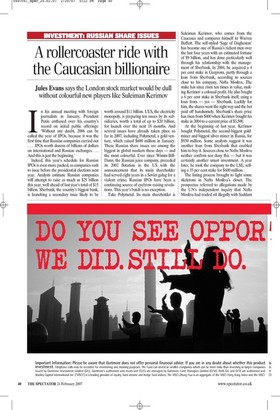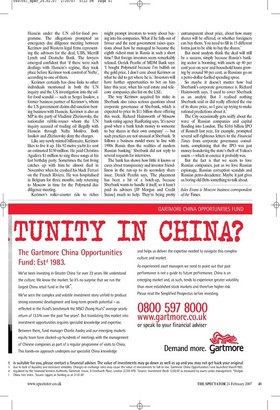A rollercoaster ride with the Caucasian billionaire
Jules Evans says the London stock market would be dull without colourful new players like Suleiman Kerimov n his annual meeting with foreign journalists in January, President Putin enthused over his country's record on initial public offerings: 'Without any doubt, 2006 can be called the year of IPOs, because it was the first time that Russian companies carried out . . . IPOs worth dozens of billions of dollars on international and Russian exchanges. . . . And this is just the beginning' Indeed, this year's schedule for Russian IPOs is even more packed, as companies rush to issue before the presidential elections next year. Analysts estimate Russian companies will attempt to raise as much as $25 billion this year, well ahead of last year's total of $15 billion. Sberbank, the country's biggest bank, is launching a secondary issue likely to be worth around $11 billion. UES, the electricity monopoly, is preparing ten issues by its subsidiaries, worth a total of up to $20 billion, for launch over the next 18 months. And several issues have already taken place so far in 2007, including Polymetal, a gold venture, which raised $600 million in January. These Russian share issues are among the biggest in global markets these days — and the most colourful. Ever since Wimm-BillDann, the Russian juice company, preceded its 2002 flotation in the US with the announcement that its main shareholder had served eight years in a Soviet gulag for a violent crime, Russian IPOs have been a continuing source of eyebrow-raising revelations. This year's batch is no exception.
Take Polymetal. Its main shareholder is Suleiman Kerimov, who comes from the Caucasus and compares himself to Warren Buffett. The self-styled 'Sage of Daghestan' has become one of Russia's richest men over the last four years with an estimated fortune of $9 billion, and has done particularly well through his relationship with the management of Sberbank. In 2004, he acquired a 4 per cent stake in Gazprom, partly through a loan from Sberbank, according to sources close to his company, Nafta Moskva. The stake has since risen ten times in value, making Kerimov a colossal profit. He also bought a 6 per cent stake in Sberbank itself using a loan from — yes — Sberbank. Luckily for him, the shares went the right way and the bet paid off handsomely. Sberbank's share price has risen from $400 when Kerimov bought his stake in 2004 to a current price of $3,500.
At the beginning of last year, Kerimov bought Polymetal, the second-biggest goldminer and biggest silver-miner in Russia, for $930 million Some analysts suggest it was another loan from Sberbank that enabled him to buy it. Sources close to Nafta Moskva neither confirm nor deny this — but it was certainly another smart investment. A year later, he took the company to the LSE, selling a 35 per cent stake for $600 million The listing process brought to light some skeletons in Nafta Moskva's closet. The prospectus referred to allegations made by the UN's independent inquiry that Nafta Moskva had traded oil illegally with Saddam Hussein under the UN oil-for-food programme. The allegations prompted an emergency due diligence meeting between Kerimov and Western legal firms representing the advisors for the deal, UBS, Merrill Lynch and Deutsche Bank. The lawyers emerged confident that 'if there were such dealings with Hussein's regime, they took place before Kerimov took control of Nafta', according to one of them.
Kerimov certainly has close links to other individuals mentioned in both the UN inquiry and the US investigation into the oilfor-food scandal — such as Sergei Issakov, a former business partner of Kerimov's, whom the US government claims did sanction-busting business with Hussein. Kerimov is also an MP in the party of Vladimir Zhirinovsky, the nationalist rabble-rouser whom the UN inquiry accused of trading oil illegally with Hussein through Nafta Moskva. Both Issakov and Zhirinovsky deny the charges.
Like any newly minted billionaire, Kerimov likes to live it up. His 92-metre yacht Ice cost an estimated $150 million He paid Christina Aguilera $1 million to sing three songs at his last birthday party. Sometimes the fast living catches up with him: he almost died in November when he crashed his black Ferrari on the French Riviera. He was hospitalised in Belgium for three months, only returning to Moscow in time for the Polymetal due diligence meeting.
Kerimov's roller-coaster ride to riches might prompt investors to worry about buying into his companies. What if he falls out of favour and the next government raises questions about how he managed to become the eighth richest man in Russia in such a short time? But foreign investors seem remarkably relaxed. Derick Pearlin of MDM Bank says: 'I bought Polymetal because I'm bullish on the gold price. I don't care about Kerimov or what he did to get where he is.' Investors will have further opportunities to bet on him later this year, when his real estate and telecom companies also list on the LSE.
The way Kerimov acquired his stake in Sberbank also raises serious questions about corporate governance at Sberbank, which is expected to price its $11 billion share offering this week. Richard Hainsworth of Moscow bank-rating agency RusRating says, 'It's never good when a bank lends money to someone to buy shares in their own company' — but such practices are not unusual at Sberbank. 'It follows a business model more in line with 1990s Russia than the realities of modern Russian banking.' Sberbank did not reply to several requests for interviews.
The bank has shown how little it knows or cares about transparency and investor friendliness in the run-up to its secondary share issue. Derick Pearlin says, 'The placement has been a bit of a botch-up, because Sberbank wants to handle it itself so it hasn't paid its advisers [JP Morgan and Credit Suisse] much to help. They're being pretty untransparent about price, about how many shares will be offered, or whether foreigners can buy them. You need to fill in 15 different forms just to be able to buy the shares.'
But most analysts think the deal will still be a success, simply because Russia's banking sector is booming, with assets up 40 per cent year-on-year and household loans growing by around 90 per cent, as Russians go on a petro-dollar-fuelled spending spree.
So maybe it doesn't matter how bad Sberbank's corporate governance is. Richard Hainsworth says, 'I used to cover Sberbank as an analyst. But I realised nothing Sberbank said or did really affected the rise of its share price, so I gave up trying to make rational predictions about it.'
The City occasionally gets sniffy about the wave of Russian companies and capital flooding into London. The $10.6 billion IPO of Rosneft last year, for example, prompted several self-righteous letters to the Financial Times from corporate governance consultants, complaining that the IPO was just money-laundering the state's theft of Yukos's assets — which in essence it probably was.
But the fact is that we seem to love Russian companies, just as we love Russian espionage, Russian corruption scandals and Russian petro-decadence. Maybe it just gives us boring old Brits something to talk about.
Jules Evans is Moscow business correspondent of the Times.























































 Previous page
Previous page